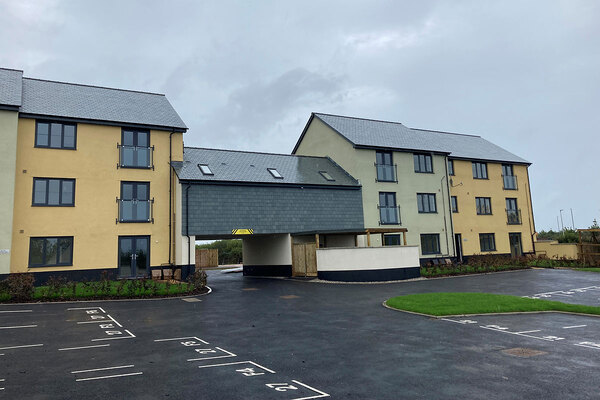You are viewing 1 of your 1 free articles
Supported housing provider found non-compliant over issues of ‘serious regulatory concern’
The regulator has found a Midlands-based supported housing provider to be non-compliant over issues of “serious regulatory concern”, including “inherent conflicts of interest”.
The Regulator of Social Housing (RSH) has today issued New Roots with a G3 non-compliant rating for governance and V3 non-compliant rating for viability, following a full investigation of the group first announced in November.
The regulator found the provider to have “significant weaknesses” in its business planning framework and “inadequate risk management processes and internal controls”.
Other issues included New Roots’ board failing “to manage its affairs with the appropriate degree of skill, independence, diligence, effectiveness, prudence and foresight”.
The provider said it “entirely understands and accepts the judgement” and admitted “significant and systemic failings”.
The RSH said: “There are significant gaps and inconsistencies between figures contained in its financial plan and key supporting information, and New Roots is unable to demonstrate that its rents assumptions are compliant with relevant legislation.”
It added: “Evidence seen by the regulator has identified occasions where the board had not been fully informed, or have not been requested to make decisions, on material events.”
The regulator also flagged a “lack of assurance over probity arrangements and relationships with third party contractors”.
The judgement said: “Inherent conflicts of interest relating to former board members and employees of New Roots were identified. The board has been unable to provide compelling evidence that appropriate probity policies and arrangements were in place to effectively manage these conflicts.
“In the absence of evidence to the contrary, the regulator has concluded that these arrangements could be inappropriately advancing the interests of a third party.”
New Roots was founded in 1996 and registered with the RSH in 2014. It had a turnover of £12.2m in its last reported full-year, employs 46 full-time staff and manages 1,782 supported housing units in the Birmingham area.
The provider operates as an ‘exempt accommodation’ housing association. This is a category of supported housing in which landlords provide the loosely defined “care, support or supervision” to residents for which they can charge rents significantly higher than those of mainstream social housing.
The model has proved controversial, with one charity raising concerns over the lack of accountability.
In December, Jonathan Walters, deputy chief executive of the RSH, told Inside Housing that it had blocked “exempt accommodation providers from registering as registered providers”.
Related Files
In its judgement, the regulator noted New Roots had experienced “rapid growth” in recent years. The provider has landlord responsibility for its tenants but enters into short-term leasing arrangements on properties. The RSH said New Roots had appointed new independent board members and brought in extra executive support in response.
The regulator said: “The board, with the support of its advisors, has developed a financial and governance improvement action plan that also aims to address and review all its stock in terms of statutory compliance and repairs. It has also sought to address the conflicts of interest identified.
"The board is in the process of implementing this action plan. The board has provided assurance that it has sufficient liquidity to meet its short-term obligations as it considers its future strategic direction.”
In a comment emailed to Inside Housing, New Roots said: “The Regulator of Social Housing has judged New Roots Limited to be non-compliant both in terms of governance and viability. The board of New Roots entirely understands and accepts this judgement.
“Changes in the New Roots board, in the senior management team and in our operational planning are being implemented with the aim of ensuring that New Roots is able to provide a secure and qualitative service to tenants while working positively with both statutory and other key partners.
“We are pleased that the regulator has recognised the current work being done by New Roots to address its problems. The board is committed to continue to work with the regulator, openly and in partnership, to address what are significant and systemic failings.”
Regulatory judgements in England explained
The Regulator of Social Housing publishes regulatory judgements for all providers owning 1,000 or more social housing homes.
These judgements set out whether the provider is complying with the regulator’s governance and financial viability standards.
The regulator carries out an assessment either through a scheduled in-depth assessment, or reactive engagement (in which the regulator acts following information about a provider).
It then awards the provider a rating from one to four for financial viability (V) and a separate rating from one to four for governance (G).
Providers must score two or higher in both categories to be judged as complying with the standards.
As providers have increasingly taken on more risk to cross-subsidise social and affordable housing delivery through market-facing activity, the regulator has changed a number of associations’ viability ratings from V1 to V2.
The regulator often categorises this kind of regulatory action as ‘regrades’ rather than downgrades. Click here to read more.
Key to ratings:
V1/G1: Compliant
V2/G2: Compliant
V3/G3: Non-compliant and intensive regulatory engagement needed
V4/G4: Non-complaint, serious failures, leading to either intensive regulatory engagement or the use of enforcement powers
Rating straplines in full:
Governance ratings:
G1: The provider meets our governance requirements.
G2: The provider meets our governance requirements but needs to improve some aspects of its governance arrangements to support continued compliance.
G3: The provider does not meet our governance requirements. There are issues of serious regulatory concern and in agreement with us the provider is working to improve its position.
G4: The provider does not meet our governance requirements. There are issues of serious regulatory concern and the provider is subject to regulatory intervention or enforcement action.
Financial viability ratings:
V1: The provider meets our viability requirements and has the financial capacity to deal with a wide range of adverse scenarios.
V2: The provider meets our viability requirements. It has the financial capacity to deal with a reasonable range of adverse scenarios but needs to manage material risks to ensure continued compliance.
V3: The provider does not meet our viability requirements. There are issues of serious regulatory concern and, in agreement with us, the provider is working to improve its position.
V4: The provider does not meet our viability requirements. There are issues of serious regulatory concern and the provider is subject to regulatory intervention or enforcement action.
Jargon-busting: some regulatory terms and what they mean
- Co-regulation: this means boards are responsible for deciding how to meet the regulator’s standards – the regulator does not prescribe how to do this
- Gradings under review list: a public list of providers under investigation who are at risk of being judged non-compliant with regulatory standards
- In-depth assessment: a planned inspection, in which the regulator assesses a providers viability, governance and approach to value for money
- Narrative regulatory judgement: a detailed explanation of the reasons behind a regulatory judgement. Narrative judgements are published where a providers’ viability or governance ratings have changed, or where RSH has particular issues or concerns.
- Reactive engagement: refers to the regulator reacting to complaints or allegations about a provider and taking action
- Stability check: an annual assessment of all providers owning 1,000 social homes or more. RSH uses accounts and statistical return data to check for any changes in a providers’ risk profile.
- Strapline regulatory judgement: where a provider is meeting the standards, and its governance or viability ratings have not changed since its previous judgement, the regulator does not publish a full judgement explaining its reasons for the gradings. Instead it just publishes the gradings themselves, in a ‘strapline’.











